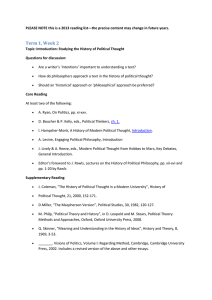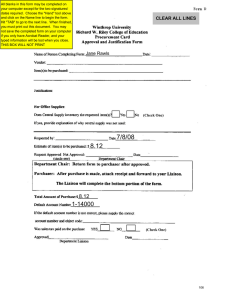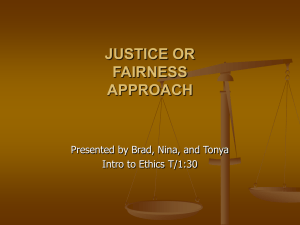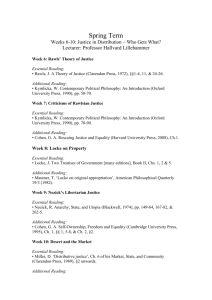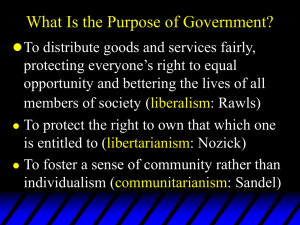Term 1, Week 2
advertisement
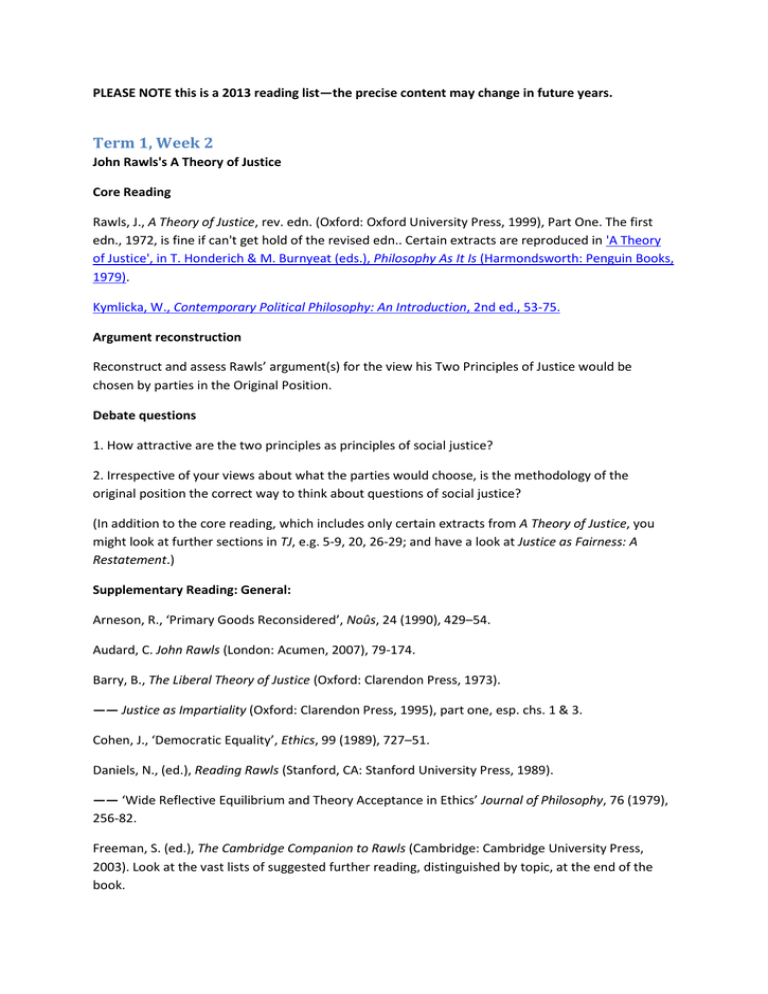
PLEASE NOTE this is a 2013 reading list—the precise content may change in future years. Term 1, Week 2 John Rawls's A Theory of Justice Core Reading Rawls, J., A Theory of Justice, rev. edn. (Oxford: Oxford University Press, 1999), Part One. The first edn., 1972, is fine if can't get hold of the revised edn.. Certain extracts are reproduced in 'A Theory of Justice', in T. Honderich & M. Burnyeat (eds.), Philosophy As It Is (Harmondsworth: Penguin Books, 1979). Kymlicka, W., Contemporary Political Philosophy: An Introduction, 2nd ed., 53-75. Argument reconstruction Reconstruct and assess Rawls’ argument(s) for the view his Two Principles of Justice would be chosen by parties in the Original Position. Debate questions 1. How attractive are the two principles as principles of social justice? 2. Irrespective of your views about what the parties would choose, is the methodology of the original position the correct way to think about questions of social justice? (In addition to the core reading, which includes only certain extracts from A Theory of Justice, you might look at further sections in TJ, e.g. 5-9, 20, 26-29; and have a look at Justice as Fairness: A Restatement.) Supplementary Reading: General: Arneson, R., ‘Primary Goods Reconsidered’, Noûs, 24 (1990), 429–54. Audard, C. John Rawls (London: Acumen, 2007), 79-174. Barry, B., The Liberal Theory of Justice (Oxford: Clarendon Press, 1973). —— Justice as Impartiality (Oxford: Clarendon Press, 1995), part one, esp. chs. 1 & 3. Cohen, J., ‘Democratic Equality’, Ethics, 99 (1989), 727–51. Daniels, N., (ed.), Reading Rawls (Stanford, CA: Stanford University Press, 1989). —— ‘Wide Reflective Equilibrium and Theory Acceptance in Ethics’ Journal of Philosophy, 76 (1979), 256-82. Freeman, S. (ed.), The Cambridge Companion to Rawls (Cambridge: Cambridge University Press, 2003). Look at the vast lists of suggested further reading, distinguished by topic, at the end of the book. —— Rawls (London: Routledge, 2007), chs. 1-6. Kukathas, C., & P. Pettit, Rawls (Cambridge: Polity Press, 1990). Levine, A., Engaging Political Philosophy (Oxford: Blackwell, 2002). Okin, S., Justice, Gender and the Family (New York: Basic Books, 1989), ch. 5. Pogge, T., Realizing Rawls (Ithaca, NY: Cornell University Press, 1989). —— John Rawls: His Life and Theory of Justice (Oxford: Oxford University Press, 2007). Rawls, J., Collected Papers, ed. Samuel Freeman (Cambridge, MA: Harvard University Press, 1999). —— Justice as Fairness: A Restatement, ed. Erin Kelly (Cambridge, MA: The Belknap Press of Harvard University Press, 1999). Scanlon, T. M., ‘Rawls’s Theory of Justice’, University of Pennsylvania Law Review, 121 (1973), 1029– 69. —— ‘The Diversity of Objections to Inequality’, in his The Difficulty of Tolerance (Cambridge: Cambridge University Press, 2003), or in Matthew Clayton and Andrew Williams (eds.), The Ideal of Equality. Sen, A., ‘Justice: Freedom versus Means’,PPA, 19 (1990), 111–21. Swift, A., & S. Mulhall, Liberals and Communitarians, 2nd ed. (Oxford: Blackwell, 1996), intro. Vallentyne, P., Steiner, H. and Otsuka, M. (2005) 'Why Left-Libertarianism is Not Incoherent, Indeterminate, or Irrelevant: A Reply to Fried', Philosophy and Public Affairs, 33(2), 201-15. On the difference principle (There are general discussions of the difference principle in most of the introductory books. The following constitute more detailed treatments. See also reading under the following three four weeks for further discussion of Rawls’s conception of socioeconomic justice.) Barry, B., Theories of Justice, chs. 1.1, 6. —— The Liberal Theory of Justice, chs. 9-11. —— Justice as Impartiality, sec. 9. Hare, R.M., ‘Rawls’ theory of justice’, in Daniels Reading Rawls. Harsanyi, J., ‘Can the Maximin Principle Serve as a Basis for Morality’, American Political Science Review, 69 (1975), 594-606. Martin, R., ‘Economic Justice: Contractarianism and Rawls's Difference Principle’, in D. Boucher, D. & P. Kelly (eds.), The Social Contract from Hobbes to Rawls(London: Routledge, 1994). Nagel, T., ‘Equality’, in his Mortal Questions (Cambridge: Cambridge University Press, 1979). Parfit, D., ‘Equality or Priority?’, in Matthew Clayton and Andrew Williams (eds.), The Ideal of Equality. Pogge, T., Realizing Rawls, ch. 4, sec. 17. —— John Rawls: His Life and Theory of Justice, 106-120. Rawls, A Theory of Justice, secs. 1-5 (intro), 11-17 (the pareto argument), 20-29 (the rational choice argument), 47-49, 77, 80-81. —— ‘Reply to Alexander and Musgrave’, Quarterly Journal of Economics, 88 (1974), reprinted in Rawls’s Collected Papers(difficult). Van Parijs, P., ‘Difference Principles’, in Freeman (ed.), The Cambridge Companion to Rawls. Waldron, J., ‘John Rawls and the Social Minimum’, in his Liberal Rights (Cambridge: Cambridge University Press, 1993).
